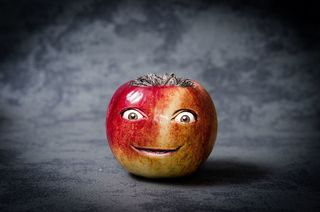
Does a Happy Meal really make us happy? Research tells us that people who live in places with higher concentrations of fast-food restaurants tend to be more financially impatient including that they save less money. But what about happiness?

Canadian researchers explored the link between happiness and fast-food logos and packaging (House et al., 2014). They served two groups of people the same food. One group’s food came on nice ceramic plates. The other group’s food came in McDonald’s fast-food containers. The dishware had no direct effect on happiness. However, there was an indirect effect. Normally, exposure to nature, even just photos of nature, can increase happiness. Though nature photos increased happiness for both groups in this study, and the boost was greater for the group that got the ceramic plates. The researchers repeated the study, replacing the nature photos with Italian opera music. Listening to the music increased enjoyment more for people whose food came on ceramic plates. Those who received the food in fast-food containers enjoyed the music less and were more impatient with the music.
In short, fast food logos and packaging can undermine our ability to savor the good things in life like nature and music. The logos and packaging can make us impatient.
What about eating healthy food? A longitudinal study of over 12,000 Australians examined the relationship between well-being and eating fruits and vegetables (Mujcic & Oswald, 2006). The results showed that eating more fruits and vegetables was associated with benefits. Life satisfaction increased as the number of servings of fruits and vegetables increased.

A similar study assessed Iranian students’ eating habits (Lesani et al., 2016). The happiest students shared three characteristics: they ate breakfast every day, they ate three meals and one or two snacks every day, and they had more than eight servings of fruits and vegetables per day.
In another study, over 400 young adults recorded their food consumption during a 13-day period (Conner et al., 2015). Those who ate more fruits and vegetables scored higher in flourishing, creativity, and curiosity.
We know that eating fruits and vegetables has physical health benefits over the long term. However, these studies suggest that eating fruits and vegetables can have more immediate benefits to our psychological health.
However, if we aren’t eating healthily, the research gives us some hope. In one study, participants were randomly assigned to one of two groups (Meier, Noll & Molokwu, 2017). One group got crackers to eat, the other chocolate. The chocolate recipients showed an increase in positive mood compared with the cracker recipients. Moreover, when the people in the chocolate group were instructed to eat the chocolate mindfully (paying attention to its smell, taste, and texture), the increase in their positive moods was even greater.
Thus, switching from a happy meal to a healthy meal may increase your happiness. But, if you are going to eat chocolate, do it mindfully.
Beyond eating carrots and apples, how can we increase our happiness? Check out my video series for some ideas.

